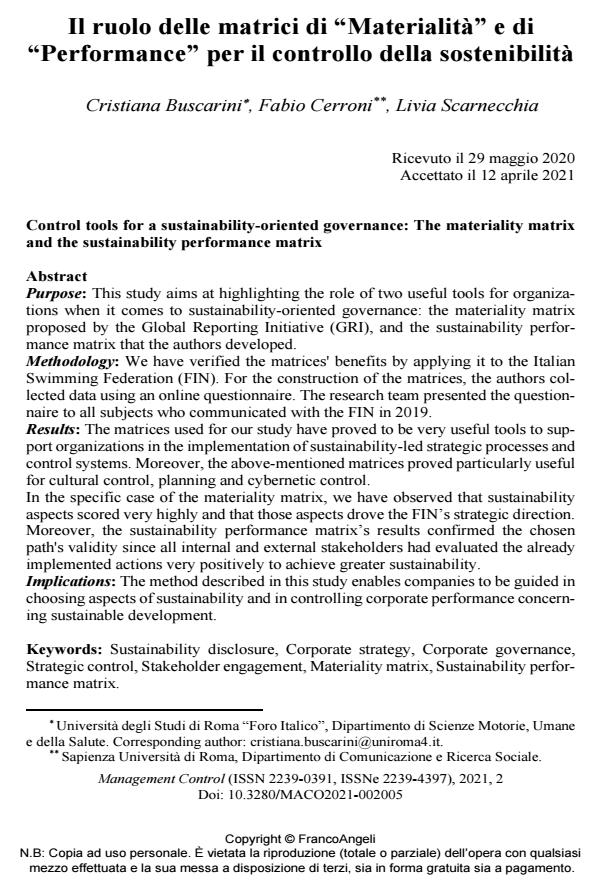Il ruolo delle matrici di "Materialità" e di "Performance" per il controllo della sostenibilità
Titolo Rivista MANAGEMENT CONTROL
Autori/Curatori Cristiana Buscarini, Fabio Cerroni, Livia Scarnecchia
Anno di pubblicazione 2021 Fascicolo 2021/2
Lingua Italiano Numero pagine 20 P. 87-106 Dimensione file 411 KB
DOI 10.3280/MACO2021-002005
Il DOI è il codice a barre della proprietà intellettuale: per saperne di più
clicca qui
Qui sotto puoi vedere in anteprima la prima pagina di questo articolo.
Se questo articolo ti interessa, lo puoi acquistare (e scaricare in formato pdf) seguendo le facili indicazioni per acquistare il download credit. Acquista Download Credits per scaricare questo Articolo in formato PDF

FrancoAngeli è membro della Publishers International Linking Association, Inc (PILA), associazione indipendente e non profit per facilitare (attraverso i servizi tecnologici implementati da CrossRef.org) l’accesso degli studiosi ai contenuti digitali nelle pubblicazioni professionali e scientifiche.
Purpose: This study aims at highlighting the role of two useful tools for organiza-tions when it comes to sustainability-oriented governance: the materiality matrix proposed by the Global Reporting Initiative (GRI), and the sustainability perfor-mance matrix that the authors developed. Methodology: We have verified the matrices' benefits by applying it to the Italian Swimming Federation (FIN). For the construction of the matrices, the authors col-lected data using an online questionnaire. The research team presented the ques-tionnaire to all subjects who communicated with the FIN in 2019. Results: The matrices used for our study have proved to be very useful tools to support organizations in the implementation of sustainability-led strategic process-es and control systems. Moreover, the above-mentioned matrices proved particu-larly useful for cultural control, planning and cybernetic control. In the specific case of the materiality matrix, we have observed that sustainability aspects scored very highly and that those aspects drove the FIN’s strategic direction. Moreover, the sustainability performance matrix’s results confirmed the chosen path's validity since all internal and external stakeholders had evaluated the al-ready implemented actions very positively to achieve greater sustainability. Implications: The method described in this study enables companies to be guided in choosing aspects of sustainability and in controlling corporate performance concerning sustainable development.
Parole chiave:Sustainability disclosure, Corporate strategy, Corporate governance, Strategic control, Stakeholder engagement, Materiality matrix, Sustainability per-formance matrix.
- Integrated Reporting come sistema manageriale per raggiungere obiettivi di sviluppo sostenibile: una verifica empirica Riccardo Santoni, in MANAGEMENT CONTROL 1/2023 pp.43
DOI: 10.3280/MACO2023-001003 - Shaping Tomorrow Alberto Dello Strologo, Edoardo D’Andrassi, Francesca Ventimiglia, pp.69 (ISBN:978-3-031-78998-4)
- How are family businesses approaching the double materiality principle? A multiple case study Francesca Bartolacci, Roberto Del Gobbo, Michela Soverchia, in Management Decision /2025
DOI: 10.1108/MD-10-2024-2464 - La pianificazione della sostenibilità nelle aziende familiari: il ruolo dei key value drivers Ivo Hristov, Antonio Chirico, Francesco Ranalli, Riccardo Camilli, in MANAGEMENT CONTROL 3/2022 pp.109
DOI: 10.3280/MACO2022-003006
Cristiana Buscarini, Fabio Cerroni, Livia Scarnecchia, Il ruolo delle matrici di "Materialità" e di "Performance" per il controllo della sostenibilità in "MANAGEMENT CONTROL" 2/2021, pp 87-106, DOI: 10.3280/MACO2021-002005